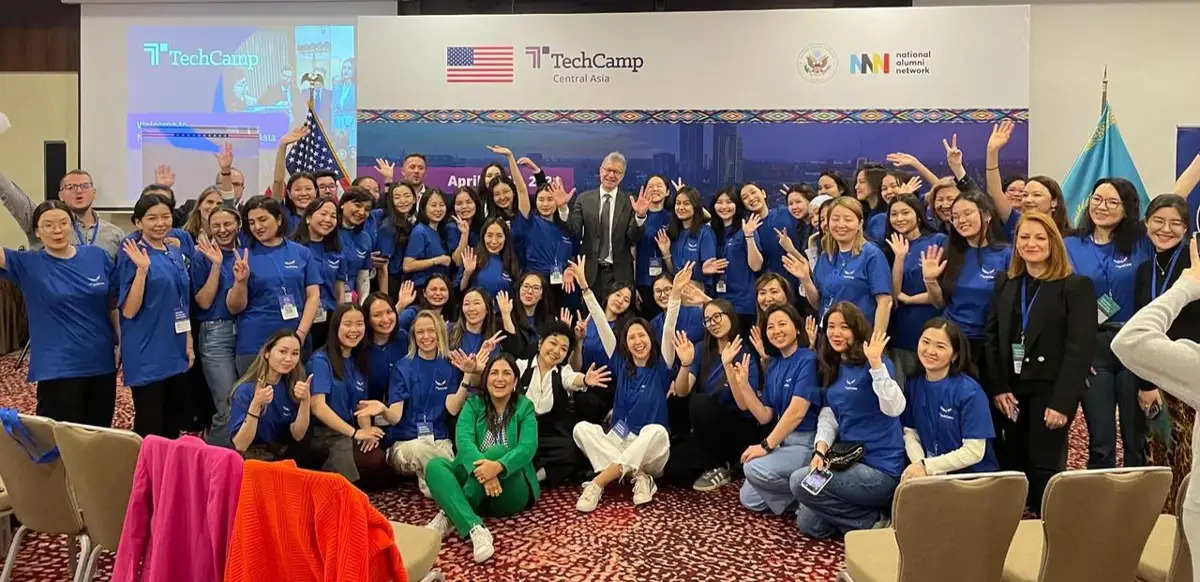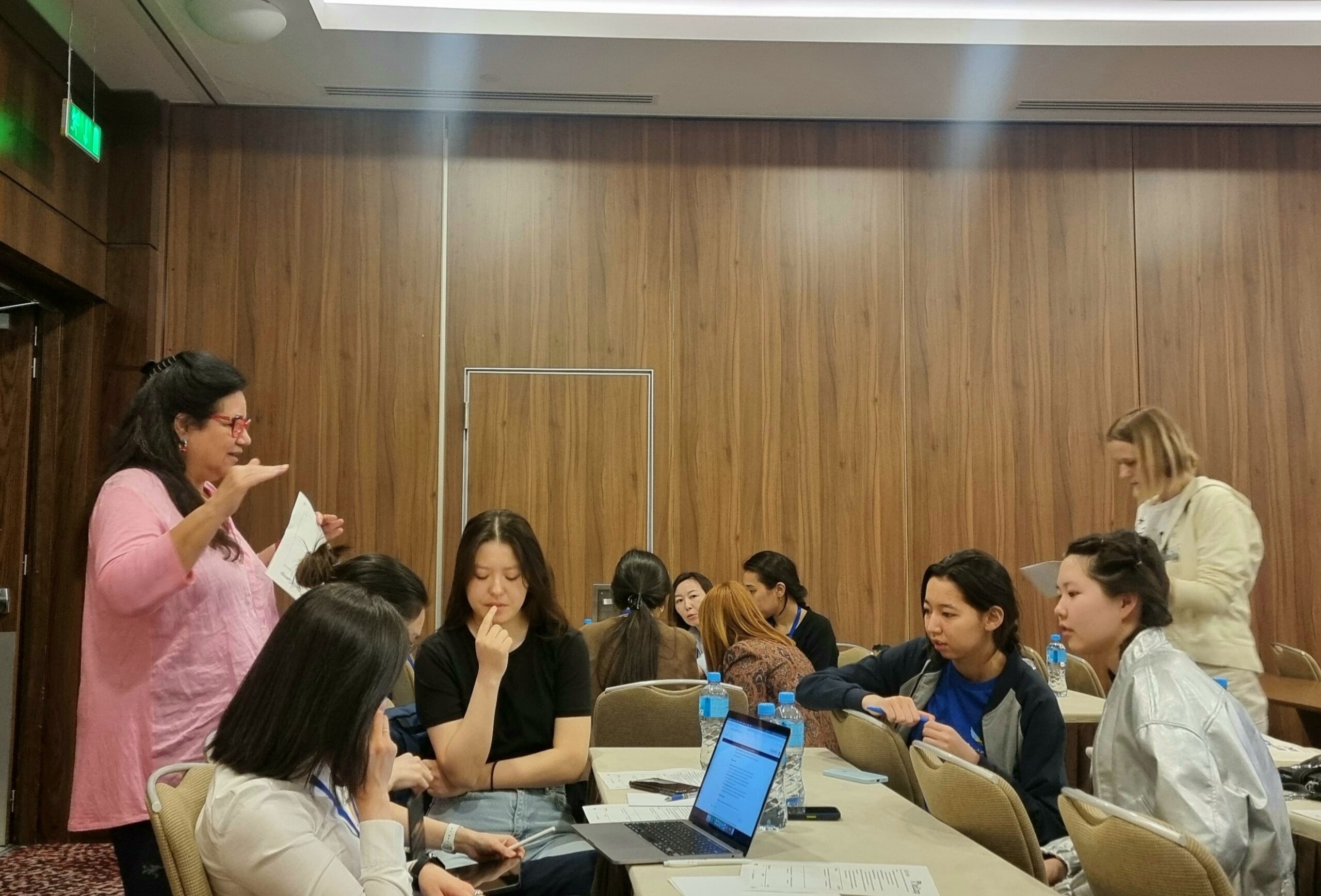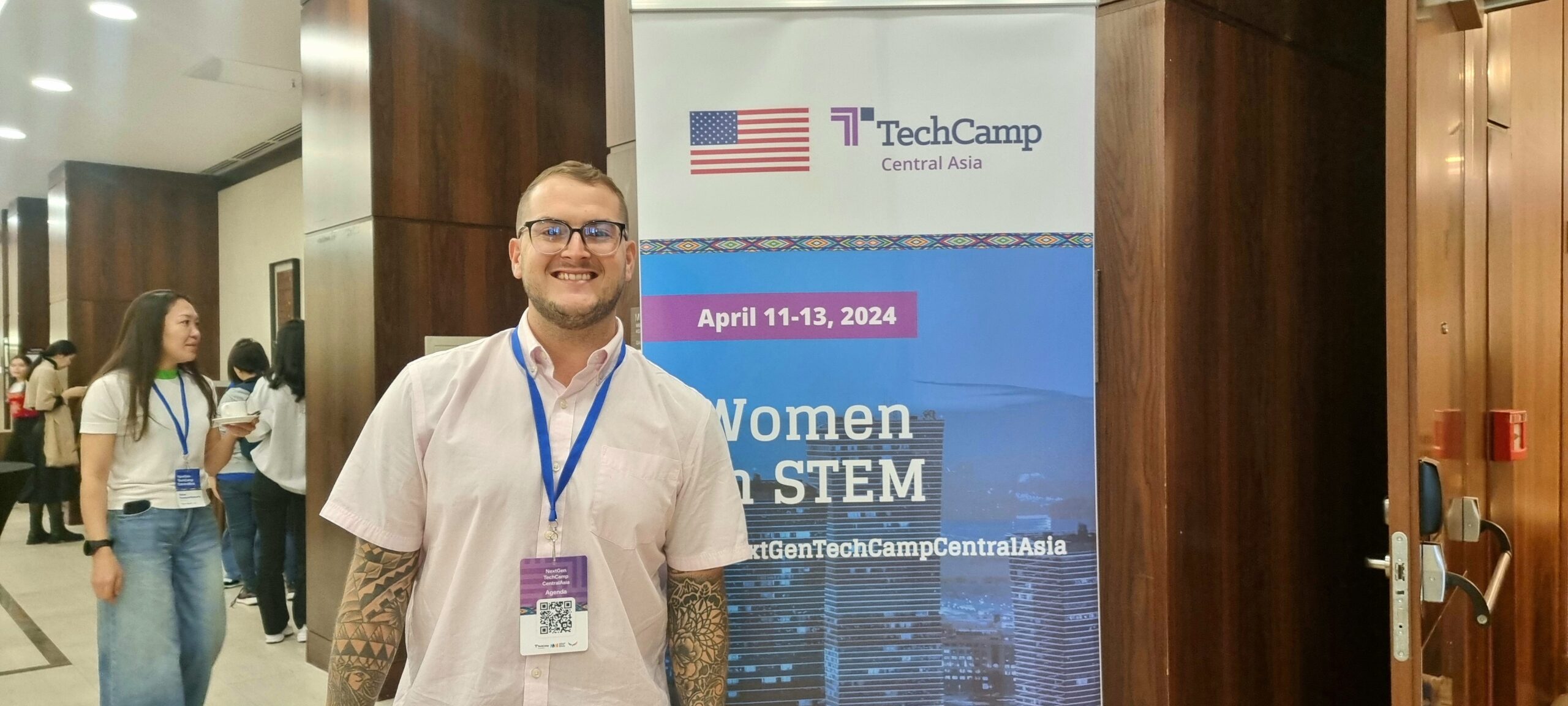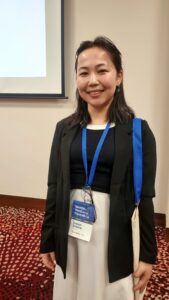ASTANA – The NextGen TechCamp of Central Asia, dedicated to strengthening the role of women in science, technology, engineering, and mathematics (STEM), took place in the Kazakh capital on April 11-13. Organized by the United States Embassy in Kazakhstan, the event aimed to underscore efforts to advance women’s participation in STEM fields and promote economic diversification in Central Asia and Pakistan.

Daniel Rosenblum, the U.S. Ambassador to Kazakhstan, interactes with participants at the NextGen TechCamp. Photo credit: Diana Bizhanova/ Kazinform
Expert trainers provided skills development sessions covering areas such as product development, artificial intelligence (AI), investment attraction, and effective mentoring relationships to 50 Techgirl graduates.
Addressing the participants, Daniel Rosenblum, U.S. Ambassador to Kazakhstan, expressed his support for TechGirls and TechWomen exchange programs, highlighting the NextGen TechCamp as a continuation of efforts to harness the skills and insights of women in STEM fields.
“The challenges that women in STEM face are not new. Gender bias and limited opportunities persist globally, undermining individual potential and holding back our countries’ progress. Through initiatives like TechGirls, TechWomen, and now the NextGen TechCamp, we are striving to dismantle these barriers, recruit mentors, forge connections within the STEM community, and pave the way for greater and more equitable participation of women in generating economic growth,” he said.
Rosenblum emphasized that the camp aims to enrich participants’ knowledge and foster connections to develop solutions for issues they are passionate about, whether it is climate crisis, gender-based violence, or space exploration.
In an interview with The Astana Times, Shelley Taylor, CEO of Trellyz, an American technology company, commended the women, particularly the young participants, for their enthusiasm and innovative ideas across various disciplines represented at the event.

Shelley Taylor, CEO of Trelliz, a technology company, commended the women, particularly the young attendees, for their enthusiasm and innovative ideas across various disciplines represented at the event. Photo credit: The Astana Times
“The event brought together women who are just hungry to learn new things. For example, some young women, as young as 17, are launching startups or delving into AI and issues like deforestation with amazing ideas. They are here to gain expertise from people worldwide,” she said.
Discussing her session, Taylor emphasized that technology should not be pursued for its own sake.
“Do not build tech just to build tech. Sometimes people think, ‘I want to do something with AI,’ but they lack a real reason or problem they are solving,” she said.

Taylor with the participants discussing ideas during the camp’s workshop. Photo credit: The Astana Times
“We started the session by asking: Is there a real problem? Can technology solve it? You have to decide that first. If the answer is yes, then consider whether it is a mobile app, software, or website. After determining that, you can better design and develop your product by analyzing existing features to identify what is missing and what should be included,” she explained.
Taylor highlighted the gender inequality in the technology sector, noting that she has been working in the field since 1994, where men have predominantly dominated.
“It is crucial to support women in tech because it is a challenging journey they are undertaking. The other thing is I believe that women see the world differently due to our genetic disposition for caregiving and community involvement. This unique perspective allows them to identify problems and solutions that men might overlook, particularly in addressing issues like climate change,” she added.
Manuel Pereira-Colocci, program designer for the TechCamp, emphasized the camp’s role in allowing women and girls to develop solutions to local challenges, ranging from air pollution to financial literacy and business development.

Manuel Pereira-Colocci, program designer for the TechCamp. Photo credit: The Astana Times
“We are empowering women to turn their ideas into reality and encouraging them to approach problems from various perspectives,” he said.
The event brought together 50 girls from Central Asia, including Kazakhstan, the Kyrgyz Republic, Tajikistan, Turkmenistan, and Uzbekistan.
Colocci noted the high level of interest and excitement among participants, highlighting Kazakhstan as a promising environment for women in technology and STEM leadership.

Gulasal Butaeva from Uzbekistan expressed her excitement about participating in the camp, noting the valuable learning experience and the inspiration she gained from seeing young women and professionals excelling in the field. Photo credit: The Astana TIme
Gulasal Butaeva from Uzbekistan expressed her excitement about participating in the camp, noting the valuable learning experience and the inspiration she gained from seeing young women and professionals excelling in the field.
“This event exceeded my expectations. I was impressed by the professionalism of the trainers and experts, as well as the motivation displayed by women in the tech industry. Today’s problem statements and challenges have helped me refine my project ideas. When I return to my country, I plan to work on not just one, but on my two projects. One will focus on reducing the overuse of plastic packaging in supermarkets, and the other involves relaunching my bootcamp, which I have not done in two years. I am incredibly motivated and excited about the opportunities ahead,” she said.
Butaeva mentioned that it was her first visit to Kazakhstan and praised the country’s culture, particularly the widespread presence of embroidery. She emphasized how her visit provided a broader global perspective and a deeper connection to the people she met from Kazakhstan.
Reflecting on advice she received from one of the trainers, Butaeva shared, “I have learned not to waste time in solving problems that are already addressed. Right now, many girls, especially in Central Asia, are focused on gender equality. But do we need equality? Perhaps what we need is equity. I encourage everyone to shift their focus away from issues that have already been addressed and instead concentrate on global-level challenges,” she said. “We should strive to implement projects at the same level as our male counterparts and maintain inclusivity towards both genders.”
